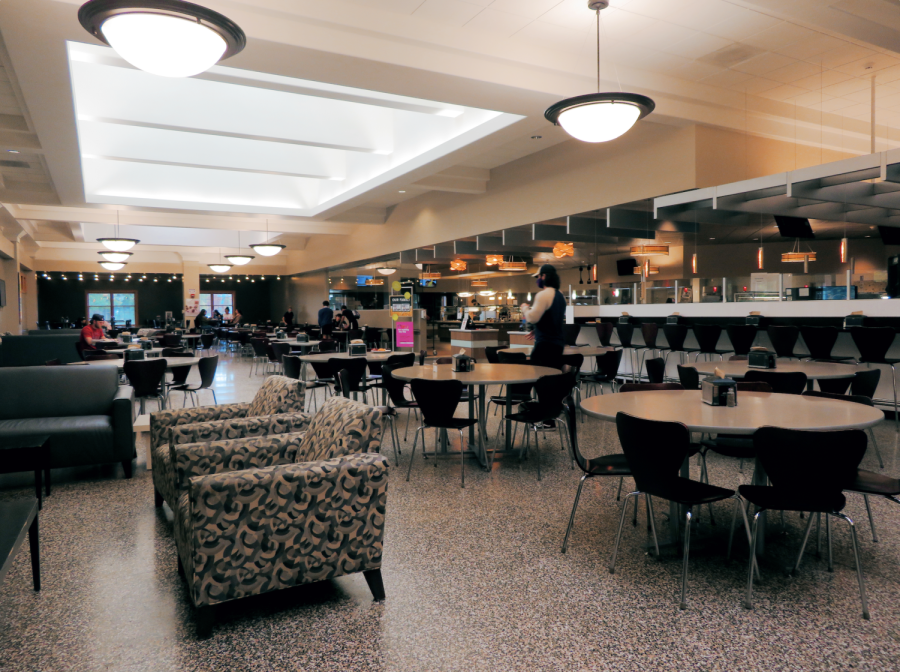Linfield University students consistently left hungry for more in Dillin Dining Hall
Linfield University’s Dillin Hall dining program, popular among all first and second-year students, claims to offer signature brands and menu selections that include almost every item imaginable.
Despite all the unique options, though, many Linfield students and student-athletes have reported being hungry for more in recent years.
Linfield currently requires a meal plan for all full-time resident first-year students. The plan includes meal balances and flex dollars, which allows you to purchase grab-and-go groceries along with smoothies, snacks and coffee. Items from The Wildcat Express are currently non-refundable, and any unused funds will be forfeited at the end of the school year.
Administrators at Linfield University assert that students who live in residence halls are welcome to enjoy unlimited meal plans, which allow them to come to Dillin during mealtimes and eat as much or as little, frequently or sparingly as they like. But students tell a different story.
In recent months there has been considerable concern about whether there will be enough food to meet the demands of Linfield athletes, as well as how the dining hall hours could be better structured to coincide with teams practice times.
“We pay so much money to come here and get to eat at Linfield, for the amount of times that I have gone hungry after football practice, it is a real safety hazard.” said international student Matua Whalen, a freshman defensive tackle from Umatac, Guam. “Usually late after practice, I have to go out of my way to pay more to get food off campus or cook for myself.”
With students paying between $2,800-$3,100 per semester for food, I would hope all students can comfortably eat three meals a day. In a similar vein, given that over 30% of Linfield’s student body participates in athletics and understanding that having a car on campus is a luxury, I would think that student-athletes’ health and safety would receive attention from trustees and administrators at Linfield.
During the week, Dillin opens for dinner at 5:00 p.m. and closes at 8:00 p.m., smack in the middle of most athletic practices. For some sports, practices can run past 8:00 p.m., resulting in missing mealtime.
According to Keegan Brooks, a sophomore center back on the Linfield men’s soccer team, during Brooks’ first year at Linfield he lost 25 pounds due to not eating.
“During the season, our coach would let us out early to go eat in Dillin, but when we got there there was never any food left for us to eat,” said Brooks. “After practicing for hours, you are hungry, and it’s frustrating when you are paying a lot of money for food and don’t even get to have dinner.”
Along with members of both the men’s soccer team, members of Linfield’s celebrated football team are not only frustrated but worried with the service from the dining hall for the safety of all Linfield athletes. Similar to Brooks, many members of the Linfield football team have lost substantial weight from the inconvenient hours.
“It became so common for players to lose so much weight that in the offensive line team room we would refer to it as the freshman 25,” said Leykamm, a center for the Linfield football team. He was referring, of course, to the infamous “Freshman 15,” a nickname for the weight many first-year college students put on when they suddenly have unlimited access to dining halls (and often, alcohol).
“Football players work hard to get to a point where we can achieve certain goals. It really makes us start to question if we are really reaching our true potential.”
As of right now, the coaches for the Linfield football team are unaware of this so-called “freshman 25,” but I am sure they would not be pleased. Since coming to Linfield this fall, Leykamm has lost 30 pounds. In response to his substantial weight loss, Leykamm said both his parents were concerned about his health and safety as an athlete.
In response to the growing concern, parents of Linfield students have even joined in on the discussion on Linfield’s private parents and families Facebook group demanding that they see change in the quality and service from Dillin for the safety of their students. Due to the private nature of this group, I’m not going to name any parents, but will share some of their written comments in an anonymous fashion.
One Linfield parent wrote, “The issue is hours of availability, especially for athletes who have no choice but to get late dinners only to have the dining hall closed. Considering the percentage of student-athletes, why would the school require an unlimited meal plan for athletes knowing it is not unlimited.”
All non-student athletes at Linfield, including myself, have had their own dining problems. Non-student athletes are frequently forced to rush early to the dining hall because they know there won’t be any food left by the end of the night.
“Considering how popular athletics are at Linfield and when athletics practices are held, I am shocked that Linfield only offers dinner until 8:00 p.m,” said Linfield freshman Theo Netter. “As a non-athlete, I don’t know what I would do for food if my schedule wasn’t as flexible as it is.”
Sodexo USA, the subsidiary dining company partnered with Linfield University for the past six years, offers dining and facilities management services to over 850 colleges worldwide. Included in the colleges that work with Sodexo is Gonzaga University, among several others on the West Coast. The dining hall at the University of California Los Angeles, another Sodexo client, is the best in the country according to an article posted in 2019 by Business Insider.
According to Kate Inge, a senior at Gonzaga, Gonzaga University’s dining hall offers extensive and luxury options for students such as freshly made sushi, an on-campus Qdoba and weekly “Salmon Wednesdays.”
This leaves me wondering why we are receiving different services than other schools that work with the same food management and service company. Javier Lopez, Linfield’s Sodexo general manager, did not respond to request for comment.
The installation of more upscale food options, such as a Panera Bread or Chick-Fil-A, for all students in Dillin has been discussed in recent years, according to Emma Campbell, president of the Associated Students of Linfield University (ASLU). However, there isn’t quite enough money to implement that solution, as is the case with most issues at Linfield University.
While I’m not advocating for every student to experience gaining the dreaded Freshman 15, I think we can all agree that depriving our football players of food — resulting in significant and unnecessary weight loss — is no way to keep our beloved streak alive.
Now, if you’ll excuse me, I better hustle over to Dillin before all the good stuff is gone.







Lisa Goodwin • Mar 3, 2023 at 5:20 pm
As a parent of a current student, I was surprised at how bad the food was at Dillin. I know several alumni who ave all regaled me with stories of making fresh waffles, having salmon, many more choices, and college-faves like pizza and burgers at multiple meals each week. Having eaten there myself, I know that often there are only 3-4 options, but they are usually the same options with the same low-quality food, and serving students who have special diets simply means a student has to go find someone, ask, wait, and be ready to eat the same thing regularly. The staff are really nice but I feel bad that they have to serve that food. Linfield has obviously negotiated the cheapest contract possible and required the most students to purchase it. The chicken “tenders” often have very little meat in them; most chicken is thigh meat; the beef is low-grade, and students regularly avoid any cooked pieces of meat that is not in something else as it’s been found to be undercooked (even though the fish, also low-grade, is overcooked). Students have also complained that their GI systems suffer because of the food at Dillin. My son even says he would get sicker from Dillin than Taco Bell (and that’s saying something). Thank goodness for the salad bar, but you can’t eat that for every lunch and dinner. As soon as we could take our child off the meal plan, we did. Unfortunately, I know that a significant portion of students who are required to purchase the meal plan can’t afford it and take out loans to cover room and board. I have relatives at other schools who cost the same or less than Linfield (both tuition and room/board) and have either Sodexo, Aramark, or Bon Appetit as their contractor. I’ve never seen, heard of, or tasted food as bad as that of Linfield. I have a nephew at Elon University who raves about the vegan French toast they have regularly. Let me know when they start serving vegan French toast at Linfield and I’ll come back to try it.
Andrew Goodwin • Mar 3, 2023 at 2:08 pm
First, they expect sophomore RAs to pay for meal plans out of their own work study. Then, they raise room and board 3% to make up for a budget deficit. So now, even though you pay skyrocketing prices for usually sub-par food (e.g., raw chicken), you can’t even eat it? It would be nice if Student Affairs would do something about it, but right, it’s just that “[we] get tired of eating the same cooking after a while,” or whatever is said to parents every year.